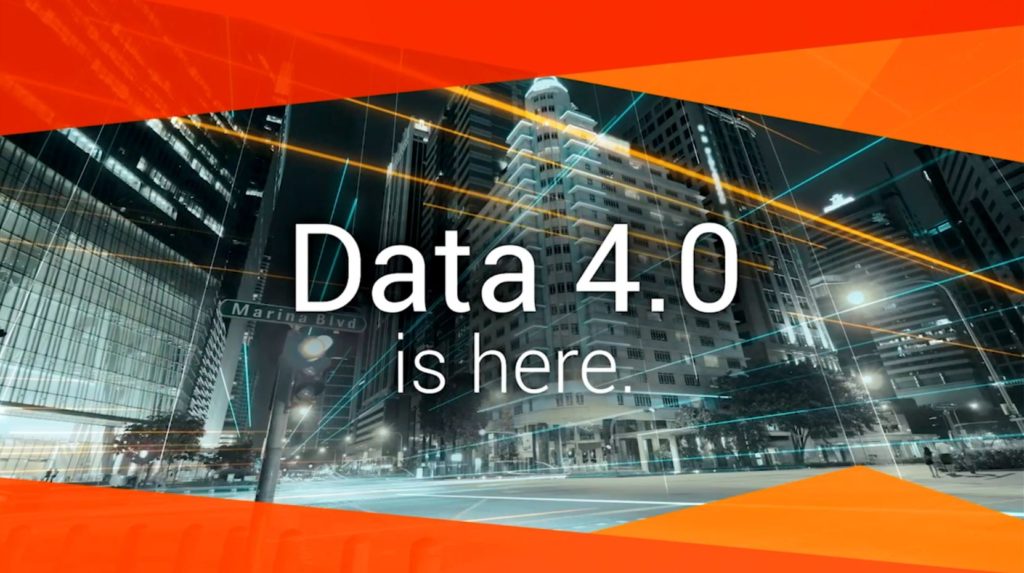Data 4.0: The Soul of Digital Transformation
Succeeding in a New World of AI-Powered Intelligent Data Management

I want to first acknowledge all the challenges and hardships that everyone is experiencing around the globe—both personally and professionally—with a special thank you to all the heroes out there on the front lines. From all of us at Informatica, we hope you, your family and loved ones are healthy and safe.
In these times of uncertainty, one thing is clear: the need for digital transformation has accelerated as most of you are looking to increase productivity, automation, flexibility, and agility. Digital transformation is a fundamental re-write of business. It is comprised of four pillars of innovation:
- Creating new products and services
- Building new customer engagement models
- Embracing new operating models
- Implementing new business models
For digital transformation to succeed, it must be the strategic focus of an enterprise. It begins at the top…with your CEO and board of directors. It requires an end-to-end focus that includes a strategic mindset. And your digital transformation must be data-led. Digital natives are maniacal about leveraging data to make business decisions and to ensure they can drive critical innovation at scale. Maintaining the status quo is not the answer to successfully navigating all the changes required to adapt your organization for our new reality.
To support your transformation, any technology you adopt must be cloud-native—especially best-of-breed cloud and multi-cloud. Cloud is a key enabler to every digital transformation, and we’re only seeing adoption of cloud increasing exponentially:
- Over 80% of workloads are expected to be run in the cloud this year and the same number are expected to move between clouds. We’re truly in a multi-cloud reality.
- We also hear that in just two years we’ll see three quarters of all databases deployed or migrated to cloud platforms.
There’s no such thing as a separate cloud strategy—cloud must be integral to your entire digital transformation.
Data 1.0 to Data 3.0
Before I dive into where we’re all heading, let me briefly remind you where we’ve been.
Over the years, we’ve all had to change the way we think about and manage data.
- In Data 1.0, data was used in specific business applications, like payroll automation, airline reservations, or retail transactions. Informatica helped you thrive in that era by defining the ETL (extract, transform, load) market and leading in data integration.
- In Data 2.0, data was used to support enterprise-wide business processes, like supply chain, straight-through processing, and quote to cash. Informatica helped you thrive in that era by expanding our capabilities to add data quality, technical data governance, data archiving application retirement, MDM, test data management, (early days) cloud data management, and other data services.
- And for the past few years, we’ve all been focused on Data 3.0—where data was recognized as the asset that would power entire businesses to be transformed through new business models and processes. We expanded into all things cloud data management, MDM solutions, business data governance, data cataloging, data privacy management, and other data services.
We were all accelerating fast through Data 3.0, but the current state of the world has now delivered a true paradigm shift to Data 4.0.
Data 4.0: AI-Powered Intelligent Data Management

To realize the benefits of Data 4.0, we must redefine previous assumptions and enter a world that is cloud-native and metadata-driven, supported by intelligent automation and trusted insights, at operational scale. And all of this must guarantee data trust. This can only be made possible if it’s powered by artificial intelligence and machine learning.
We’re seeing this acceleration from Data 1.0 to Data 3.0 as so many of you are making the case internally to innovate toward Data 4.0—following the digital transformation path I referenced as the means to get there. To date, what many of us have prioritized is actually to digitally “modernize.” Now it’s time to truly digitally “transform.” I believe that Data 4.0 is the soul of digital transformation: the intelligent and automated data fabric that will ensure you meet the outcomes and innovations required for your digital transformation.
The key distinguishing factor of Data 4.0 is the recognition that the scale, automation, and trust required can only be achieved with AI/ML capabilities. This organizational competency will likely be the difference between the success and failure of your digital transformation.
But none of this means you have to stop what you’re doing. In fact, many of you have taken solid steps into the world of Data 4.0. Whether you’re investing in cloud-native technologies through cloud data warehouses and data lakes; focusing on the best possible business outcomes for all of your key stakeholders through a digital Business 360 initiative; or deploying an enterprisewide data governance and privacy function to ensure all the data used by your organization is trusted, authenticated, and secure—you’re in fact building the necessary foundation for Data 4.0. We believe AI/ML will complement the current data heroes and make them super-heroes to achieve the complex transformational initiatives in front of them.
We have your back
Informatica has been innovating for many years in anticipation of Data 4.0’s arrival. We first recognized that data cannot truly be leveraged as a strategic enterprise asset without the power of a metadata-driven, modular platform.
For over five years now, we’ve been moving our entire portfolio of products onto a shared microservices-based, API-driven, AI-powered architecture that powers Informatica’s Intelligent Data Platform. With a shared metadata foundation leveraging our universal connectivity across every one of our solutions, the Intelligent Data Platform delivers best-in-class and integrated products and solutions that support any deployment method and any type of data, at any latency.
And for over three years now, we’ve been innovating to ensure all components of the platform are supported by CLAIRE, our AI engine, which is truly the “intelligence” driving the automation in the Intelligent Data Platform. CLAIRE’s AI and ML engine leverages our industry-leading metadata capabilities to accelerate and automate core data management and governance functions, which of course are the critical capabilities to support everyone’s path to Data 4.0
Our innovation has been recognized by Gartner who has named Informatica as a Leader in all five Magic Quadrants in which we’re evaluated [1].
And you can trust that our products support the scale of your most complex enterprise requirements. We are now processing over 22 trillion cloud transactions per month and have been recognized as #1 in customer satisfaction for over 15 years. And we have partnered with more than 5,000 active customers in every industry and geography around the world, including 85% of the Fortune 100.
I’d like to thank so many of you for your trust in us for all things data for the past three decades and counting. We have your back always, innovating and investing in your success. It has been heartwarming to see the Informatica community grow into millions across the globe. As we scale the world of data, as we march into the world of Data 4.0, you can be assured that each and every one of us at Informatica are cheering for your success and WE HAVE YOUR BACK.
To learn more, I would like to invite you to hear from innovators, thought leaders, and experts on how to succeed in the world of Data 4.0. Join us for a new digital learning experience—CLAIREview—where you’ll hear how data management fueled by AI-powered intelligence and automation can help you accelerate time to value and ROI.
[1] Gartner, Magic Quadrant for Enterprise Integration Platform as a Service, Worldwide, Eric Thoo, Massimo Pezzini, Keith Guttridge, Bindi Bhullar, 23 April 2019.
Gartner Magic Quadrant for Data Integration Tools, Ehtisham Zaidi, Eric Thoo, Nick Heudecker, 1 August 2019.
Gartner Magic Quadrant for Data Quality Tools, Melody Chien, and Ankush Jain, 27 March 2019.
Gartner Magic Quadrant for Master Data Management Solutions, Simon Walker, Alan Dayley, Sally Parker, Malcolm Hawker, 13 January 2020
Gartner, Magic Quadrant for Metadata Management Solutions, Guido De Simoni, Mark Beyer, Ankush Jain, 16 October 2019.
Gartner does not endorse any vendor, product or service depicted in its research publications, and does not advise technology users to select only those vendors with the highest ratings or other designation. Gartner research publications consist of the opinions of Gartner's research organization and should not be construed as statements of fact. Gartner disclaims all warranties, expressed or implied, with respect to this research, including any warranties of merchantability or fitness for a particular purpose.
GARTNER is a registered trademark and service mark of Gartner, Inc. and/or its affiliates in the U.S. and internationally, and is used herein with permission. All rights reserved.








